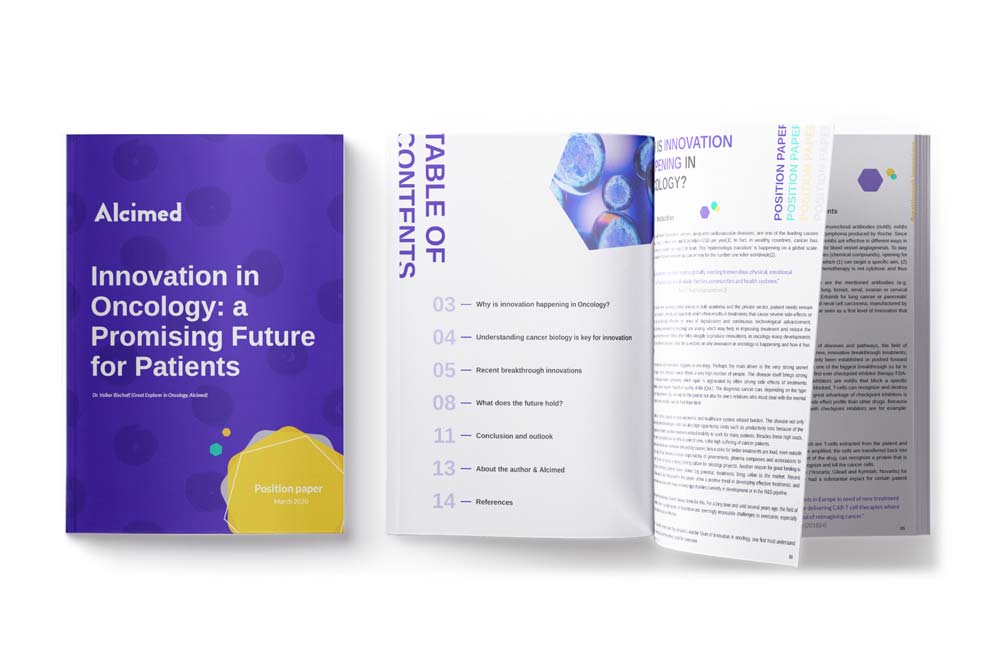Prognostic vs predictive testing
According to Alcimed’s analysis, molecular testing in prostate cancer can be broken down into two categories: prognostic vs predictive testing.
- Prognostic refers to tests that provide information on the status of the disease regardless of therapy
- While predictive refers to tests that provide information about the effect a particular therapeutic intervention.
It should be noted, however, that biomarkers and tests have the potential to serve both prognostic and predictive value, for example: next-generation imaging like PET-PSMA.
Impact of molecular testing and personalized medicine in prostate cancer in US vs Europe
PET-PSMA has been used in prostate cancer since it was developed in Germany ~20 years ago, and is now fully integrated into the patient pathway in Europe. In the US, PET-PSMA is just beginning to gain prominence and is being investigated in numerous clinical trials.
The sensitivity of PET-PSMA is increasing the number of patients diagnosed with metastatic prostate cancer in both markets, and is also identifying a new class of oligometastatic patients (patients with small tumors throughout the body). In regards to predictive testing, the US is slightly ahead of Europe with the first approval of an asset associated with genetic testing (PARP inhibitor Rubraca by Clovis Oncology) occurring in September 2020, while prognostic testing is in its early stages but is increasing in usage in both markets.
The primary manner in which these molecular tests are impacting the prostate cancer treatment landscape is by blurring the traditional 1st line / 2nd line drug progression. Rather than prescribing based on a cohort-based guidelines, physicians are gaining patient-specific information that enables them to provide a more patient-centric treatment plan in a more personalized medicine approach. This trend is creating a need for more therapies that are demonstrated to work in particular patient groups, which in turn is further emphasizing the value of molecular testing in pesonalized medicine. This positive feedback loop demonstrates the importance of molecular testing for the future of prostate cancer.
Value of molecular testing for pharma companies
As molecular testing becomes more prominent in prostate cancer, biopharmaceutical companies are looking to determine how to best integrate it into their strategies. Although the true value of testing will be determined by the particular company’s goals. Alcimed has categorized four key sources of value of molecular testing when it is coupled with a particular asset:
- Improving the efficacy by stratifying its patient population
- Accelerating the time to approval by providing new clinical endpoints
- Providing competitive value by developing an innovative target product profiles
- Providing commercial value by unlocking new indications or increasing the addressable population
In addition to this value, there is a substantial risk for companies who choose to ignore the developing trend in molecular testing. Due to its ability to act as a competitive differentiator, companies that choose to investigate testing will be at a serious advantage compared to those who do not.
Future outlooks for molecular testing and personalized medicine in prostate cancer
Molecular testing in prostate cancer is not going away. As was the case in breast, lung, colorectal and ovarian cancer, the positive feedback loop between molecular testing and assets that rely on testing will continue to drive more testing and patient-centric data, for more personalized medicine. The true impact of this feedback loop will depend on the willingness of pharmaceutical companies to drive it.
“Prostate cancer is not the first cancer impacted by molecular testing, nor will it be the last. The true impact of testing on the market will depend on companies that are willing to take an active role in demonstrating its correlation with clinical outcomes.”
says Alcimed Project Manager Andrew Rouff.
Alcimed plans to continue monitoring how the US and the EU will learn from each other the impact of these tests on patient care pathway, while also keeping an eye out for the next class of therapies that prove to be efficacious in combination with next-generation molecular tests. Stay tuned!
About the author
Danna, Great Explorer in Infectiology and immunology, in the Healthcare Alcimed’s team in U.S



